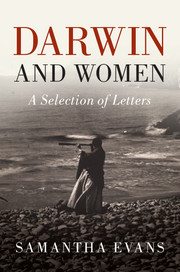Book contents
- Frontmatter
- Contents
- List of illustrations
- Foreword
- Preface
- Acknowledgments
- Symbols, abbreviations, and conventions
- 1 Friends
- 2 Marriage
- 3 Children
- 4 Scientific wives and allies
- 5 Observing plants
- 6 Companion animals
- 7 Insects and angels
- 8 Observing humans
- 9 Editors
- 10 Writers and critics
- 11 Religion
- 12 Travellers
- 13 Servants and governesses
- 14 Ascent of woman
- List of letters and provenances
- Biographical notes
- Bibliography and further reading
- Index
8 - Observing humans
Published online by Cambridge University Press: 16 February 2017
- Frontmatter
- Contents
- List of illustrations
- Foreword
- Preface
- Acknowledgments
- Symbols, abbreviations, and conventions
- 1 Friends
- 2 Marriage
- 3 Children
- 4 Scientific wives and allies
- 5 Observing plants
- 6 Companion animals
- 7 Insects and angels
- 8 Observing humans
- 9 Editors
- 10 Writers and critics
- 11 Religion
- 12 Travellers
- 13 Servants and governesses
- 14 Ascent of woman
- List of letters and provenances
- Biographical notes
- Bibliography and further reading
- Index
Summary
In his research for Expression of the emotions in man and animals, Darwin approached friends, relatives, and correspondents for information. He had a questionnaire printed that his correspondents could send further afield, since he was interested in human expression around the world. Mothers in particular were asked for information about expression in infants. Often the responses to Darwin's questions are now as interesting for the light they shed on race, class, and the respondents’ lives as for the subjects in which Darwin was principally interested.
Darwin's niece Frances Julia (Snow) Wedgwood contributed many observations, some of them drawn from her reading in Latin and Greek. The following, however, concerns the observations of her friend Jane Gourlay in a Lock Hospital. Little is known of Jane; she was tutor to the children of the nephew of Thomas Erskine, Snow's religious mentor, in Scotland, and taught at a school in Edinburgh. The Lock Hospitals were developed for the treatment of syphilis. (The name of these hospitals was derived from the Lock Lazar House of Southwark, but the origin is otherwise unclear.) They catered mostly for working-class women, and moral education would have formed part of the programme. It is not known which Lock Hospital Gourlay visited; if it was in a port or garrison town, the girl she visited might have been detained under the Contagious Diseases Acts, which allowed women suspected of being prostitutes to be detained and examined for signs of disease against their will. Darwin had evidently asked Snow for some literary quotations about the expression of shame; Snow sent a few via Henrietta, and then added:
On the other hand (but I dont know whether it is to the point when Uncle C〈h〉 asks for quotations to give facts, & of course Uncle Ch cannot care for so very obvious a fact as that people do cover their faces for shame)— Miss Gourlay told me when I was asking her if her girls ever went wrong of one of them (they are all the lowest of the low) who had gone to the bad & 〈w〉hen she (Miss G) found her in a hospital ran away from her & hid her face & cd not be persuaded to look up till Miss G had to go away. Of course she was not one to reproach the wretched creature.
- Type
- Chapter
- Information
- Darwin and WomenA Selection of Letters, pp. 122 - 135Publisher: Cambridge University PressPrint publication year: 2017



